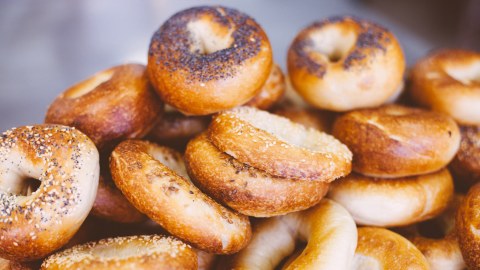What Makes New York City’s Bagels Taste Great

New York City (and parts of New Jersey), in my opinion, offers up the best bagels anywhere, and I’m not the only one that thinks so. Many people would agree with me, save for maybe a few haters. But while it’s widely agreed upon that the New York City bagel is the best out there, the reason why has been a topic of constant debate.
The American Chemical Society has taken on the task of settling the mystery and revealing the secret behind what makes an amazing bagel in their fun video explainer. In it, narrator Noel Waghorn states that the water, which is imported from the Catskill Mountains, does play a minor part in that New York City’s water is “soft” (i.e., it has low levels of calcium and magnesium) — one of the softest in the country (after Boston).
These ratios affect how the gluten in the bagel dough reacts. Where hard water fortifies gluten, making the bagels tough, soft water makes the gluten gooier. New York City’s water, or water from the Catskills, hits that happy medium for bagel making. However, that’s not all, according to Chef Richard Coppedge. He says good bagel bakeries let the rolled bagel dough sit in a cooler for a couple of days, allowing the yeast in the dough to ferment and create up to 50 flavor compounds. Yum.
Then, he says, they’re plopped into a boiler with water and baking soda for anywhere from 30 seconds to three minutes, allowing the starch to pre-gelatenize. That’s what makes for that shiny outside, which also helps lock in the awesome flavors.
However, this explainer doesn’t let outside bagel makers off the hook for spotty bakemanship. Just because they don’t live in the Catskills or have access to its waters, doesn’t mean they can’t get the same soft-water chemistry going on in their shops. Waghorn says just adding some calcium sulfate if you live in Boston and your water is too soft, or filtering it down with a water softener if your water is too hard, will help bakers create the right balance.
But even if you have the right water chemistry, Waghorn says you’ll be wasting your time if you don’t cool and boil your dough.
Wylie Dufresne explains how we’ve learned so much about the food we cook through chemistry — what causes food to rise, certain tastes to come alive, and so on.
Watch the full video on how New York City bagels are made on YouTube.
Photo Credit: Shutterstock



